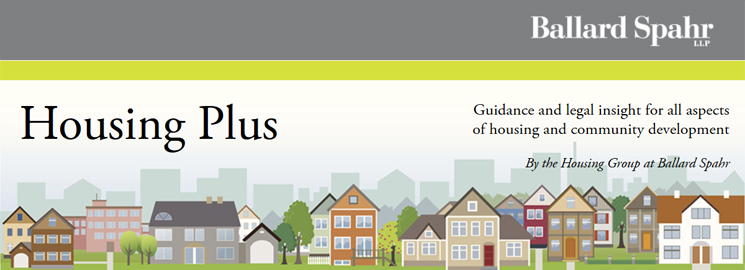
 On March 24, 2014, the Fifth Circuit was the first Circuit to directly adopt HUD’s new disparate impact rule. Inclusive Communities Project v. Texas Dep’t of Hous., 2014 WL 1257127 (5th Cir. Mar. 24, 2014). Now, a challenge to HUD’s new rule may be headed to the Supreme Court. HUD’s new rule recognizes that liability can attach even in the absence of discriminatory intent with a showing that a practice has a discriminatory effect (disparate impact). While many Circuits have explicitly or implicitly acknowledged that liability may be established by a showing of disparate impact after an analysis of the Fair Housing Act itself, the Fifth Circuit expressly adopted the legal standard promulgated by the HUD regulation regarding HUD’s recognition of a cause of action and burden of proof in housing discrimination cases, specifically addressing low-income and racial disparate impact.
On March 24, 2014, the Fifth Circuit was the first Circuit to directly adopt HUD’s new disparate impact rule. Inclusive Communities Project v. Texas Dep’t of Hous., 2014 WL 1257127 (5th Cir. Mar. 24, 2014). Now, a challenge to HUD’s new rule may be headed to the Supreme Court. HUD’s new rule recognizes that liability can attach even in the absence of discriminatory intent with a showing that a practice has a discriminatory effect (disparate impact). While many Circuits have explicitly or implicitly acknowledged that liability may be established by a showing of disparate impact after an analysis of the Fair Housing Act itself, the Fifth Circuit expressly adopted the legal standard promulgated by the HUD regulation regarding HUD’s recognition of a cause of action and burden of proof in housing discrimination cases, specifically addressing low-income and racial disparate impact.
Inclusive Communities Project involved a Fair Housing Act challenge to the allocation of low income housing tax credits. The plaintiff, a group that assists low-income families eligible for Section 8 vouchers, argued that the Texas Department of Housing and Community Affairs (“Texas DHCA”) disproportionately approved tax credits for non-elderly affordable housing developments in predominantly minority neighborhoods while it disproportionately denied tax credits for the similar affordable housing developments in predominately white neighborhoods. After a bench trial, the district court, finding a disparate impact existed from plaintiff’s statistics and concluded that the Texas DHCA had a legitimate bona fide interest in its review process, but it had not produced any evidence that there were no less discriminatory alternatives. The trial court adopted a remedial plan that included alterations to the process in which tax credits were awarded and implemented an annual review for at least five years. Defendants appealed. On appeal, the Fifth Circuit adopted the burden-shifting approach found in HUD’s new disparate impact rule. In so doing, the Fifth Circuit reversed and remanded the case to the trial court to apply the new burden-shifting approach. Specifically, the Fifth Circuit reversed and remanded the case to the trial court, instructing it to apply the three-step burden-shifting approach found in HUD regulation—namely, that plaintiff must first prove discrimination by showing that a challenged practice causes a discriminatory effect (typically done through statistics); second, the defendant must prove that the challenged practice is necessary to achieve one or more substantial, legitimate, nondiscriminatory interests; and third, the plaintiff must then show that the defendant’s interests could be served by another practice that has a less discriminatory effect.
While the Fifth Circuit case did not challenge the validity of HUD’s regulation (as the currently pending American Insurance Association v. HUD, Case No. 13-cv-966, in the US District Court for the District of Columbia does), its significance is twofold. First, the Fifth Circuit expressly adopted the HUD regulation and instructed a trial court to use the framework in reassessing the merits of the case. Because of the relative novelty of HUD’s rule, this appears to be the first instance in which a Circuit Court has adopted the framework from the regulation itself, rather than relying on prior precedent. Second, in May, the Texas DHCA filed a petition for certiorari with the Supreme Court, requesting that the Court hear the case and whether disparate impact claims are recognized under the Fair Housing Act. Should the Supreme Court grant certiorari and agree to hear the case, it would be the third Fair Housing Act disparate impact case before the Supreme Court since 2012. The prior two cases, Twp. Of Mount Holly v. Mt. Holly Gardens Citizens in Action, Inc. and Magner v. Gallagher, were both settled before the Court could answer the question. In its petition, the Texas DHCA argues that the Supreme Court should grant the petition because the issues before the Court are “indistinguishable from the questions on which this Court granted certiorari in Gallagher and Mount Holly,” that the scope of potential disparate impact liability makes the matter of “exceptional importance,” and that the statutory language of the Fair Housing Act does not expressly provide for disparate impact, as does Title VII and the ADEA. Briefs in opposition are due to the Supreme Court by Monday June 16, 2014. It is also likely that the United States, through the Solicitor General’s office, will file an amicus curie brief, as was done in both Gallagher and Mount Holly. Once the briefs have been submitted, the Supreme Court will decide whether to hear the case.